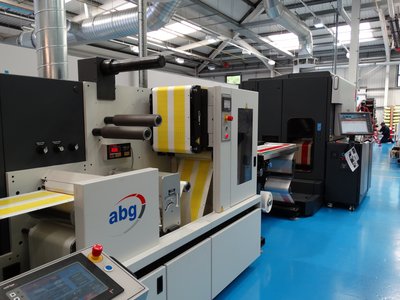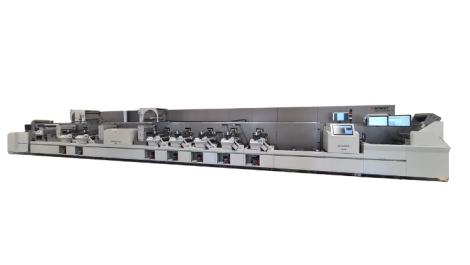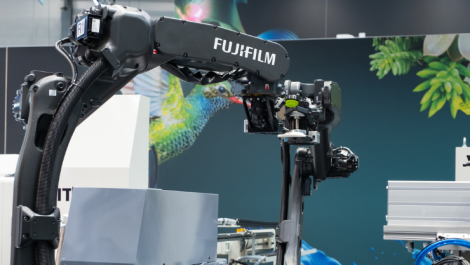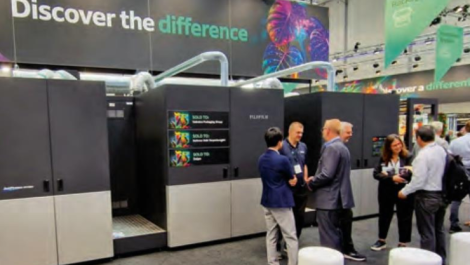The Digicon at Berkshire Labels working inline with the HP WS6600 is both JDF and JMF-enabled, and offers single pass production
When high quality converter, Berkshire Labels, added digital print technology to its flexo capability, it turned to ABG International to supply and install complementary converting equipment. Nick Coombes visited the family business in Hungerford, UK, to see the new machinery in action, and spoke with managing director, Paul Roscoe, about the effect it has had on his company’s performance.
‘We have always prided ourselves on producing quality work, from the early days of letterpress in 1983, through to the single pass UV flexo presses we have today. But it was the decision in 2010 to invest in a digital press that really focused our minds on how to make the best use of its unique production capability. How do we maximise its effectiveness, while maintaining our reputation as a supplier of premium products?’ asked Mr Roscoe. The answer came in the form of a detailed discussion with the UK’s leading manufacturer of narrow web converting technology, AB Graphic International, which with its Omega inspection rewinders, had long been a trusted supplier of Berkshire Labels.
High automation
Having taken time to evaluate the options for digital printing, Berkshire Labels selected and installed an HP Indigo WS6000 engine in 2011 and elected to add an ABG Digicon series 2 finishing line to convert the printed webs coming off the press. The Digicon provided semi-rotary flexo, laminating, die-cutting, slitting and rewind capabilities. According to Mr Roscoe, ‘There was a steep learning curve to climb in the first 12 months and we had to run two shifts to cope with the output. Workflow planning needs a whole new way of thinking, and we had to develop new markets to fill the capacity, which involved re-educating staff and customers alike.’
Once the company had a clearer picture of how to maximise the potential of the Indigo, it installed a second ABG line – this time a Digicon Lite, with flexo, laminating, die-cutting, slitting and rewinding facilities, and moved production to three shifts.
While well accepted in the commercial print market, digital technology initially suffered from a poor market perception in the market for high quality labels. Mr Roscoe knew that if his investment in digital print was to succeed he needed to convince customers that consistent quality and reliable delivery, coupled with a sharp price, were all available, just as they always have been with flexo. ‘In the final reckoning, they are not interested in how it is produced, only that it meets their criteria for quality, delivery and price. If we could take print process out of the equation we could demonstrate what extra creative opportunities digital production could offer them,’ he added.
By 2013 Berkshire Labels was confident that it had ticked all the boxes and was in a position to move to the second phase of its £2 million investment programme. At the end of the year it installed an HP Indigo WS6600 (and upgraded its 6000 line), and this time added an inline JDF and JMF-enabled ABG Digicon to raise its single pass capability to that of its flexo lines. Converting inline brings many benefits, notably less downtime, less work in progress, and the need for fewer operators. ‘Inline finishing gives us superior control and greater efficiency, and we now have one of the most automated lines in Europe,’ claimed Mr Roscoe, with a sense of genuine pride.
Read the full story in the next issue of Digital Labels & Packaging






